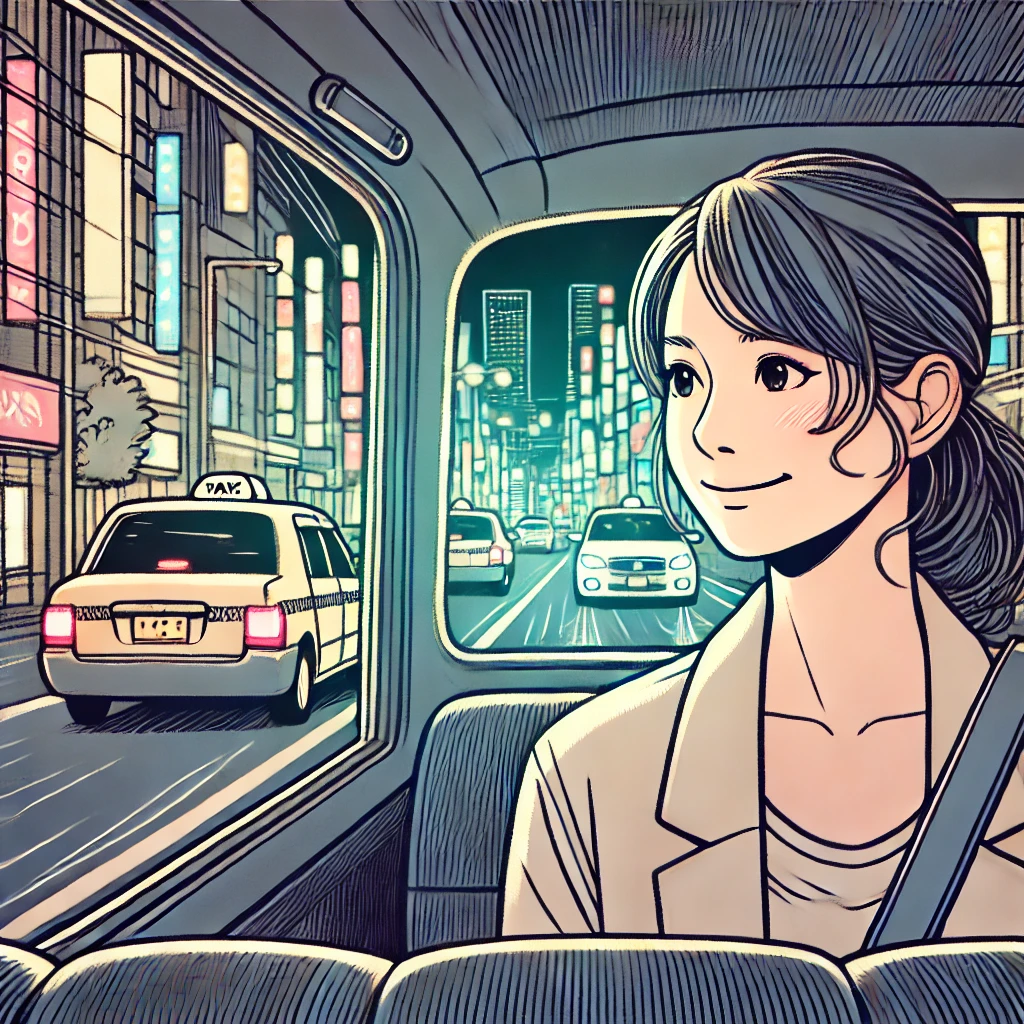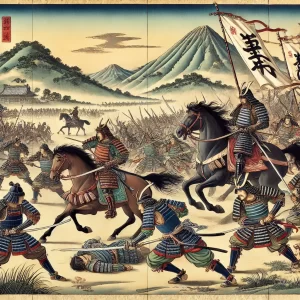traveling [Traveling]
宇多田ヒカル [UTADA Hikaru]
Words & Music : 宇多田ヒカル [UTADA Hikaru]
“Traveling” is Hikaru Utada‘s 9th single, released in November 2001.
仕事にも精が出る
shigoto ni mo sei ga deru
金曜の午後
kinyō no gogo
タクシーもすぐつかまる(飛び乗る)
takushī mo sugu tsukamaru (tobinoru)
目指すは君
mezasu wa kimi
- 仕事(しごと) [shigoto] : work
- 精が出る(せいがでる) [sei ga deru] : work hard
- 金曜(きんよう) [kinyō] : Friday
- 午後(ごご) [gogo] : afternoon
- タクシー(たくしー) [takushī] : taxi
- すぐ [sugu] : soon
- つかまる(つかまる) [tsukamaru] : catch
- 飛び乗る(とびのる) [tobinoru] : hop on
- 目指す(めざす) [mezasu] : aim
- 君(きみ) [kimi] : you
(translation) “Working hard
Friday afternoon
A taxi is quick to catch (I hop on)
My aim is you”

「どちらまで行かれます?」
dochira made ikaremasu
ちょっとそこまで
chotto soko made
「不景気で困ります(閉めます)
fukeiki de komarimasu (shimemasu)
ドアに注意」
doa ni chūi
- どちら [dochira] : where
- 行く(いく) [iku] : go
- ちょっと [chotto] : just
- そこ [soko] : there
- 不景気(ふけいき) [fukeiki] : recession
- 困る(こまる) [komaru] : struggle
- ドア [doa] : door
- 注意(ちゅうい) [chūi] : caution
(translation) “Where are you headed?
Just there
It’s tough during this recession (I will close the door)
Watch the door”
This is a conversation between the narrator and the taxi driver. 「 」 are Japanese quotation marks and indicate the taxi driver’s lines. Honorific and polite language are used.
In Japan, taxi drivers close the passenger-side door, making it feel almost like an automatic door. YouTube
風にまたぎ月へ登り
kaze ni matagi tsuki e nobori
僕の席は君の隣
boku no seki wa kimi no tonari
ふいに我に返りクラリ
fui ni ware ni kaeri kurari
春の夜の夢のごとし
haru no yo no yume no gotoshi
- 風(かぜ) [kaze] : wind
- またぐ [matagu] : stride over
- 月(つき) [tsuki] : moon
- 登る(のぼる) [noboru] : climb
- 僕(ぼく) [boku] : I (used by males)
- 席(せき) [seki] : seat
- 隣(となり) [tonari] : beside
- ふいに [fui ni] : suddenly
- 我に返る(われにかえる) [ware ni kaeru] : snap back to reality
- くらり [kurari] : dizzy
- 春(はる) [haru] : spring
- 夜(よる) [yoru] : night
- 夢(ゆめ) [yume] : dream
(translation) “I stride over the wind and climb to the moon
My seat is next to you
Suddenly, I snap back to reality, feeling dizzy
Like a dream on a spring night”
“くらり / kurari” is an onomatopoeia expressing a feeling of losing consciousness, similar to “クラクラ / kurakura.”
Perhaps the narrator is feeling drowsy, drifting between reality and a dream.
he final line, “春の夜の夢のごとし / haru no yo no yume no gotoshi” (=Like a dream on a spring night), is a passage from the famous work of classical Japanese literature, “The Tale of the Heike wiki“.
Traveling 君を
traveling kimi o
Traveling 乗せて
traveling nosete
アスファルトを照らすよ
asufaruto o terasu yo
Traveling どこへ
traveling doko e
Traveling 行くの?
traveling iku no?
遠くなら何処へでも
tōku nara doko e demo
- 乗せる(のせる) [noseru] : take aboard
- アスファルト(あすふぁると) [asufaruto] : asphalt
- 照らす(てらす) [terasu] : illuminate
- どこ [doko] : where
- 遠く(とおく) [tōku] : far
(translation) “Traveling, taking you aboard
Traveling, illuminating the asphalt
Traveling, where to?
Traveling, where are you going?
If it’s far, anywhere is fine”

Traveling もっと
traveling motto
Traveling 揺らせ
traveling yurase
壊したくなる衝動
kowashitaku naru shōdō
Traveling もっと
traveling motto
Traveling 飛ばせ
traveling tobase
急ぐことはないけど
isogu koto wa nai kedo
- もっと [motto] : more
- 揺らす(ゆらす) [yurasu] : shake
- 壊す(こわす) [kowasu] : break
- 衝動(しょうどう) [shōdō] : impulse
- 飛ばす(とばす) [tobasu] : speed up
- 急ぐ(いそぐ) [isogu] : hurry
(translation) “Traveling more
Traveling, shake it
The impulse to break it
Traveling more
Traveling, speed it up
Though there’s no need to rush”
Hikaru Utada, who wrote these lyrics, is bilingual, but even artists who aren’t often mix English into their songs in this way. The lyrics are written in two parallel modes—English and Japanese. They coexist, but they don’t blend together. This could perhaps be considered an advantage of Japanese lyrics.
聞かせたい歌がある
kikasetai uta ga aru
エンドレスリピート
endoresu ripīto
気持ちに拍車かかる
kimochi ni hakusha kakaru
狙い通り
nerai dōri
- 聞かせる(きかせる) [kikaseru] : let someone hear
- 歌(うた) [uta] : song
- ある [aru] : exist
- エンドレス(えんどれす) [endoresu] : endless
- リピート(りぴーと) [ripīto] : repeat
- 気持ち(きもち) [kimochi] : feeling
- 拍車がかかる(はくしゃがかかる) [hakusha ga kakaru] : get momentum
- 狙い通り(ねらいどおり) [nerai dōri] : as planned
(translation) “There’s a song I want you to hear
Endless repeat
Feelings gaining momentum
Just as planned”
波とはしゃぎ 雲を誘い
nami to hashagi kumo o sasoi
ついに僕は君に出会い
tsuini boku wa kimi ni deai
若さ故にすぐにチラリ
wakasa yue ni sugu ni chirari
風の前の塵に同じ
kaze no mae no chiri ni onaji
- 波(なみ) [nami] : wave
- はしゃぐ [hashagu] : frolic
- 雲(くも) [kumo] : cloud
- 誘う(さそう) [sasou] : invite
- ついに [tsuini] : finally
- 出会う(であう) [deau] : meet
- 若さ(わかさ) [wakasa] : youth
- すぐ [sugu] : soon
- ちらり [chirari] : glance
(translation) “Frolicking with the waves, inviting the clouds
Finally, I meet you
Due to youth, I quickly glance
Like dust before the wind”
The final line, “風の前の塵に同じ / kaze no mae no chiri ni onaji,” is also a famous line from “The Tale of the Heike”.
Traveling 胸を
traveling mune o
Traveling 寄せて
traveling yosete
いつもより目立っちゃおう
itsumo yori medatchaō
Traveling ここは
traveling koko wa
Traveling いやよ
traveling iya yo
目的地はまだだよ
mokutekichi wa mada da yo
- 胸(むね) [mune] : chest
- 寄せる(よせる) [yoseru] : lean
- いつも [itsumo] : always
- より [yori] : more than
- 目立つ(めだつ) [medatsu] : stand out
- ここ [koko] : here
- 嫌(いや) [iya] : dislike
- 目的地(もくてきち) [mokutekichi] : destination
- まだ [mada] : yet
(translation) “Traveling, lean your chest
Traveling, stand out more than usual
Traveling, here is
Traveling, no, I don’t like it
The destination isn’t here yet”
There’s a slightly sensual context continuing here, and “胸を寄せる / mune o yoseru” seems to imply a seductive gesture. However, the use of the cute, childlike word “ちゃう / chau” makes it feel less suggestive. The song’s tone and Hikaru Utada’s character also contribute to this. Plus, the use of the first-person pronoun “僕 / boku,” typically used by males, adds a layer of ambiguity. In this gender-free era, maybe having such a bit of mystery is a good thing, don’t you think?
Traveling 窓を
traveling mado o
Traveling 下げて
traveling sagete
何も恐くないモード
nani mo kowakunai mōdo
Traveling ここで
traveling koko de
Traveling いいよ
traveling ii yo
全ては気分次第
subete wa kibun shidai
- 窓(まど) [mado] : window
- 下げる(さげる) [sageru] : lower
- 何も(なにも) [nani mo] : nothing
- 恐い(こわい) [kowai] : scary
- モード(もーど) [mōdo] : mode
- いい [ii] : good
- 全て(すべて) [subete] : everything
- 気分(きぶん) [kibun] : mood
- 次第(しだい) [shidai] : depending on
(translation) “Traveling, lower the window
Traveling, I’m not afraid of anything
Traveling, here is
Traveling, it’s fine
Everything depends on my mood”
みんな躍り出す時間だ
minna odoridasu jikan da
待ちきれず今夜
machikirezu konya
隠れてた願いがうずきます
kakureteta negai ga uzukimasu
みんな盛り上がる時間だ
minna moriagaru jikan da
どうしてだろうか
dōshite darō ka
少しだけ不安が残ります
sukoshi dake fuan ga nokorimasu
- みんな [minna] : everyone
- 踊る(おどる) [odoru] : dance
- 時間(じかん) [jikan] : time
- 待つ(まつ) [matsu] : wait
- 今夜(こんや) [konya] : tonight
- 隠れる(かくれる) [kakureru] : hide
- 願い(ねがい) [negai] : wish
- 盛り上がる(もりあがる) [moriagaru] : get excited
- どうして [dōshite] : why
- 少しだけ [sukoshi dake] : just a little
- 不安(ふあん) [fuan] : anxiety
(translation) “It’s time for everyone to start dancing
I couldn’t wait for tonight
My hidden wishes are stirring
It’s time for everyone to get excited
Why, I wonder?
Just a little anxiety remains”

Traveling 君を
traveling kimi o
Traveling 乗せて
traveling nosete
アスファルトを照らすよ
asufaruto o terasu yo
Traveling どこに
traveling doko ni
Traveling いるの?
traveling iru no?
これからがいいところ
kore kara ga ii tokoro
(translation) “Traveling, taking you aboard
Traveling, illuminating the asphalt
Traveling, where are you?
Traveling, where are you?
The best part is just beginning”
“いいところ / ii tokoro” refers to the best part of something. See “Pepper Keibu” for another example.
Traveling もっと
traveling motto
Traveling 揺らせ
traveling yurase
壊したくなる衝動
kowashitaku naru shōdō
Traveling もっと
traveling motto
Traveling 飛ばせ
traveling tobase
止まるのが怖い ちょっと
tomaru no ga kowai chotto
- 止まる(とまる) [tomaru] : stop
- 怖い(こわい) [kowai] : scary
(translation) “Traveling more
Traveling, shake it
The impulse to break it
Traveling more
Traveling, speed it up
Stopping is a little scary”
Traveling …
traveling
The lyrics contain a variety of forms, including conversation, polite language, English, and classical quotes, making them quite interesting.
The quoted lines from “The Tale of the Heike” reflect the idea that even flourishing things will eventually fade. While the song is energetic, the line “just a little anxiety remains” echoes this theme, adding depth to the lyrics.

The creative music video by Kazuaki Kiriya also became a topic of conversation.
Thanks for reading! Feel free to comment if you have any feedback or questions.
Follow me on X.



